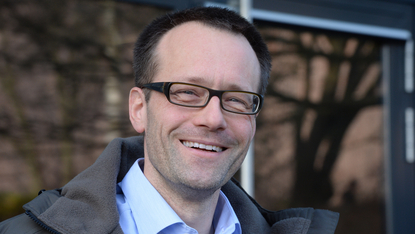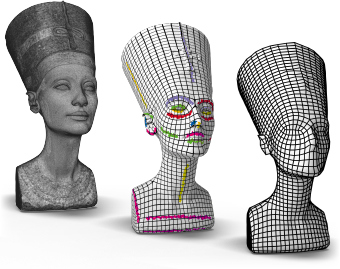Leibniz Lecture: Geometry Processing on Different Levels of Abstraction
UAlberta and the German Research Foundation (DFG) are pleased to welcome 2014 Gottfried Wilhelm Leibniz Prize recipient Dr Leif Kobbelt (RWTH Aachen) for a public lecture on Geometry Processing on Different Levels of Abstraction, which will explore geometric model representations with different levels of abstraction.
UAlberta's new Vice-President (Research), Dr. Matthias Ruth and Dr. Rainer Gruhlich, Director, DFG (German Research Foundation) Office North America will give welcoming remarks at the talk.
Thursday, May 17, 2018
3:00 PM
134 Telus Centre, University of Alberta
Reception to follow.
Abstract
Geometry Processing is the research field that deals with the algorithmic generation and optimization of 3D models. It is based on a broad portfolio of methods ranging from discrete differential geometry and mixed-integer optimization to (real-time) simulation and machine learning.
Geometry Processing serves as an enabler for a larger number of diverse applications in areas such as CAD/CAM, architecture, engineering, as well as medicine and entertainment. Depending on the specific requirements in a given application, suitable geometric representations and operations need to be provided allowing for the highly efficient and robust processing of massively complex geometric shapes.
The lecture will discuss a number of geometric model representations with different levels of abstraction where on the lowest level, geometric models can be as elementary as unstructured point clouds (raw coordinates) while on the highest level of abstraction, geometric models may be described by(procedural) rules how to construct an object from meaningful basic shape primitives. To generate these models and to effectively control their shape on the different levels of abstraction, model-based as well as data-drivenapproaches are employed.
About Dr Leif Kobbelt

Dr. Leif Kobbelt is a German university professor for Computer Science with a specialization in Computer Graphics. Since 2001 he is the head of the Institute for Computer Graphics and Multimedia at RWTH Aachen university.
After receiving his diploma in 1992 and his PhD in 1994 in Computer Science from the Karlsruhe Institute of Technology he worked at the University of Wisconsin-Madison, the University of Erlangen-Nuremberg and the Max Planck Institute of Computer Science before he moved to RWTH Aachen University in 2001. Here he built up an internationally renowned research group which eventually led to the foundation of the Visual Computing Institute at RWTH in 2015.
His research interests include 3D reconstruction, efficient geometry processing, realtime rendering, digital fabrication and multi-media applications. Kobbelt published a substantial number of influential papers in international top-conferences and journals. He also acts as a consultant, reviewer, and editor for international companies, research organizations and journals, respectively. 
For his research he was awarded with the Heinz-Maier-Leibnitz award in 2000,[3] the Eurographics Outstanding Technical Contribution Award 2004, two Günther Enderle Awards (in 1999 and 2012), an ERC Advanced Grant 2013 and the Gottfried Wilhelm Leibniz Prize in 2014. He was nominated as a Fellow of the Eurographics Association (2008) and as a Distinguished Professor of RWTH Aachen University (2013). In 2015 he became a member of the Academia Europaea and in 2016 a member of the North Rhine-Westphalian Academy of Sciences, Humanities and the Arts.
Besides university teaching, Leif Kobbelt is very active in communicating scientific topics to the general public.